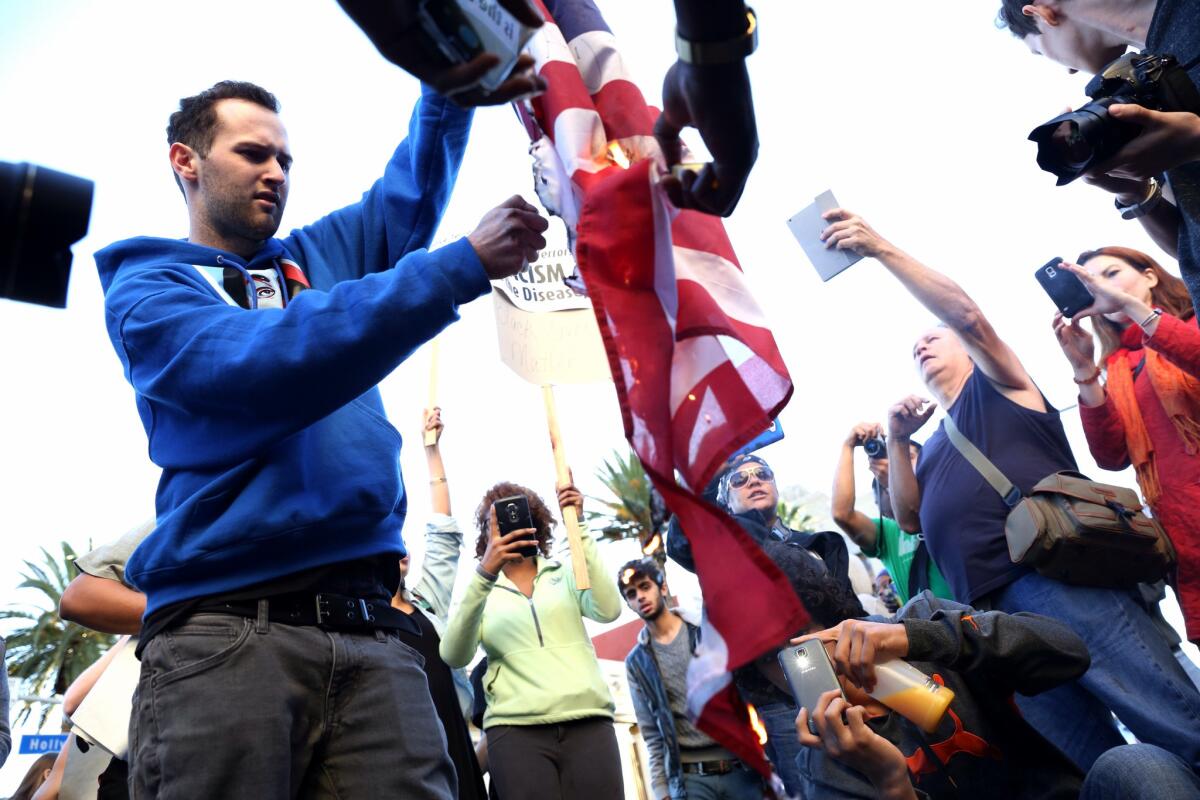Column: Grasping for divisive issues, Trump revives a real loser — banning flag burning

President Trump did not offer a word of comfort for victims of police brutality, nor for those who have lost their lives in the COVID-19 pandemic, during his rally in Tulsa, Okla., last weekend.
That would have required compassion or empathy.
But rail against an imaginary issue like flag burning? Sure, why not?
It was another cheap and easy chunk of red meat tossed to the anemic crowd on Saturday night: “We ought to come up with legislation that if you burn the American flag, you go to jail for one year!” he said, addressing Oklahoma’s two Republican senators, who basked in his attention.
It wasn’t the first time Trump has injected flag burning into the national political conversation.
In 2016, he suggested that anyone who burns an American flag should be imprisoned and lose their citizenship. Last year, when two Republican senators introduced a constitutional amendment to ban flag burning, he tweeted his support: “A no brainer!”
A couple of weeks ago, in a call with governors, he brought it up again, according to the Washington Post. If states would pass a “very powerful flag burning statute” with “strong punishment,” he promised to “back you 100%” and mused that the current members of the Supreme Court’s conservative majority “will accept that.”
There’s just one problem with Trump’s fantasy of jailing flag burners.
The Supreme Court has ruled — more than once — that flag burning is a constitutionally protected form of speech.
“If it were up to me,” the late Supreme Court Justice Antonin Scalia said in 2015, “I would put in jail every sandal-wearing, scruffy-bearded weirdo who burns the American flag. But I am not king.”
Indeed, as painful as it must have been for him not to be king, Scalia cast the deciding vote in the landmark 1989 5-4 ruling that declared that flag burning is protected under the 1st Amendment.
Even as ardent a conservative as Senate Majority Leader Mitch McConnell of Kentucky has said he supports the rights of flag burners: “No act of speech,” he wrote in 2006, “is so obnoxious that it merits tampering with our First Amendment…Surely we are strong enough to withstand a few degenerate attention-seekers.”
As angry as this country makes me at times, I would never burn an American flag. That form of protest is not my style.
But if I happened to find myself alone with a box of matches and a Confederate flag?
It’s quite possible my inner arsonist would burst into view.
::
Flag burning is one of those culture war issues that raises its ugly head every few years.
Back in 1968, Congress passed the Federal Flag Desecration Law after Vietnam War protesters destroyed American flags. Eventually, 48 states also banned flag desecration.
The Supreme Court began to challenge those laws in 1974, when it ruled that a University of Washington student named Harold Spence did not violate the law by hanging an American flag from his dorm window upside down with peace symbols taped to it. Spence hung the flag to protest the killing, in 1970, of four Kent State University anti-war protesters by Ohio National Guardsmen.
By 1989, the court had rendered invalid all state and federal laws aimed at protecting the flag from protesters.
The landmark case, Texas vs. Johnson, arose from an incident that occurred in Dallas at the 1984 Republican National Convention.
Gregory Lee “Joey” Johnson, a member of the Revolutionary Communist Party, poured kerosene on a flag that someone had ripped from a flagpole, and burned it. Johnson was protesting U.S. backing of wars against leftist governments in Central America and also the invasion of Grenada, a tiny Caribbean island where 2,000 U.S. troops were sent in 1983, in what many believed was an effort to divert attention from the bombing deaths of at least 240 troops and personnel at a Marine barracks in Lebanon.
As the flag burned, protesters chanted, “America, the red, white and blue, we spit on you.”
No one was injured, Justice William J. Brennan Jr. later wrote in his majority opinion, “though several witnesses testified that they had been seriously offended.”
Johnson was accused of “desecration of a venerated object,” convicted and sentenced to one year in jail and fined $2,000.
After the Supreme Court overturned his conviction, Congress passed the Flag Protection Act, which, again, was ruled unconstitutional by the court.
Not one to relinquish his constitutional rights, Johnson was arrested in 2016, outside the Republican National Convention in Cleveland, where he burned a flag in protest “because,” he said, “America was never great.” A judge dismissed his case, and he later won a $225,000 settlement from the city.
Johnson was arrested again last year in front of the White House, during Independence Day celebrations, for burning a flag to protest what he called Trump’s “fascist agenda.”
At what point, I have to wonder, will folks opposed to flag burning grasp the fact that the flag represents the very freedom that allows protesters to burn it? No one has ever died for the flag; they have died defending the liberty it represents.
As much as I support Joey Johnson’s right to burn the flag, I have to admit I was touched when I read what happened to the ashes of the flag he torched.
According to Brennan, a witness collected the flag’s remains in 1984, took them home and buried them in his backyard. It was, you see, just as much his right to lay the flag to rest as it was Johnson’s to burn it in the first place.
@AbcarianLAT
More to Read
A cure for the common opinion
Get thought-provoking perspectives with our weekly newsletter.
You may occasionally receive promotional content from the Los Angeles Times.











